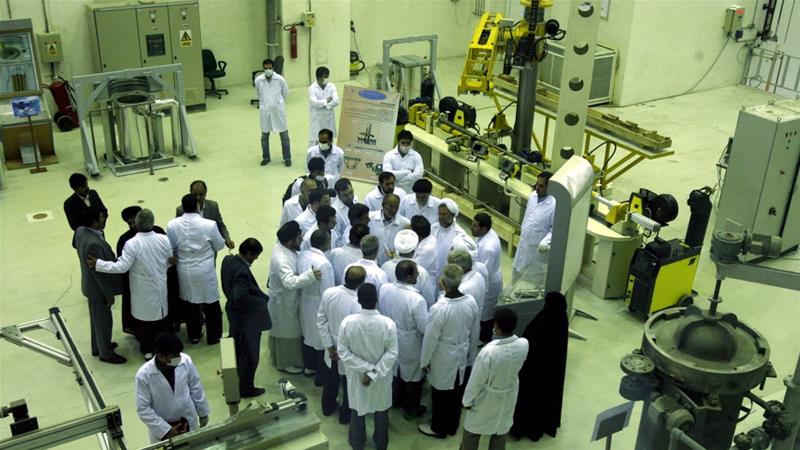Home » Middle East »
US extends Iran nuclear cooperation sanctions waivers
Secretary of State Mike Pompeo reportedly opposed extending waiver but was persuaded by the Treasury’s Steven Mnuchin.
The United States has allowed companies from Russia, China and Europe to continue their work at Iranian nuclear facilities without being subject to American sanctions, the US State Department announced on Monday.
Secretary of State Mike Pompeo signed off on the waiver extensions but couched the decision as one that continues restrictions on Iran’s atomic work.
More:
-
Swiss launch channel to send food and medicine to Iran
-
Iran’s enriched uranium stocks five times over nuclear deal limit: IAEA
-
Iran will never seek nuclear weapons: President Rouhani
Current and former officials familiar with the matter said Pompeo had opposed extending the waivers, which are among the few remaining components of the 2015 Iran nuclear deal that the administration had not cancelled.
However, the officials told The Associated Press news agency (AP) that Treasury Secretary Steven Mnuchin had prevailed in an internal debate on the subject last week.
Mnuchin reportedly argued that the coronavirus pandemic made eliminating the waivers unpalatable at a time when the administration was being criticised for refusing to ease sanctions to deal with the outbreak, which has hit Iran hard. The officials were not authorised to publicly discuss the decision and spoke to AP on condition of anonymity.
Reuters news agency earlier reported that the decision to renew waivers on sanctions that bar non-US firms from dealing with Iran’s Atomic Energy Organization was expected on Monday, citing four sources familiar with the matter including a US official.
The Jewish News Syndicate, a news outlet predominantly focused on Israel and the Jewish world, first reported that the United States was expected to renew the waivers, citing two sources familiar with the decision.
The move by the Trump administration, which in 2018 withdrew from the 2015 Iran nuclear deal and reimposed sanctions on Iran, will allow non-proliferation work to continue at the Arak heavy-water research reactor, the Bushehr nuclear power plant, the Tehran Research Reactor and other nuclear facilities.
60-day renewable waiver
As part of its “maximum pressure” campaign, the US has not only restored sanctions it had removed under the Iran nuclear deal but has tightened them to try to force Iran to curb its nuclear, missile and regional activities.
However, the Trump administration has repeatedly waived the sanctions related to non-proliferation work with Iran on the argument that such projects are designed to make the Iranian nuclear programme less capable of producing weapons.
“We will continue to closely monitor all developments in Iran’s nuclear programme and can adjust these restrictions at any time,” Morgan Ortagus, US State Department spokeswoman, said in a statement.
The waivers were renewed for 60 days, according to the statement.
Washington’s overall policy towards Tehran has faced increasing criticism from opponents and Iranian authorities who say the US sanctions are hampering the country’s efforts to tackle the coronavirus outbreak, which has killed 2,460 Iranians and made nearly 40,000 others sick.
Iranian authorities have urged other countries and the United Nations to call for the measures to be lifted.
Washington has so far refused to lift any sanctions and has even ramped up its pressure campaign.
Last week, it blacklisted five Iran- and Iraq-based companies and 15 individuals for alleged support of “terrorist groups” – its third round of sanctions on Iranian targets in two weeks.
Under the 2015 deal between Iran and six world powers – Britain, China, France, Germany, Russia and the United States – Tehran agreed to limit its nuclear programme in return for the lifting of sanctions that had crippled its economy.
Tehran has long rejected Western assertions that it has sought to develop nuclear weapons.
Source: Read Full Article



